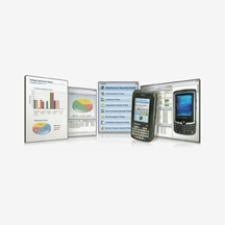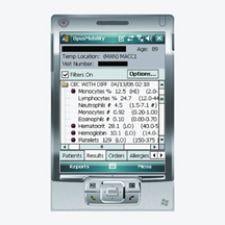
Opus Mobility offers several PDA software solutions for plans of care, electronic charting, work orders, test results, evidence-based medicine and decision support, anatomic pathology and microbiology modules and drug references.
Personal digital assistants (PDAs) have found a niche in the healthcare market since their inception several years ago, and today the devices give doctors and nurses a critical wireless connection to patient records and Web-based databases to aid diagnosis and treatment.
PDAs are no longer just for keeping track of appointments, as hospitals and healthcare systems now integrate PDA connectivity into their computer networks to allow access to patient records. This has allowed clinicians to keep up to the minute on patient conditions and review information from tests and patient vital signs even if they are not in the hospital.
Connecting PDAs to hospital systems
When hospitals issue PDAs to their staffs, the key is making the information they can access meaningful with connectivity to the hospital computer networks. SOTI Inc. is one company that provides software to connect PDA devices to hospital systems and patient electronic medical records (EMRs). It also allows large networks of these mobile devices to be managed remotely by hospital IT staff.
Children's Mercy Hospitals and Clinics in Kansas City, MO, has issued more than 400 HP iPAQ Pocket PCs to its doctors, residents and nurse practitioners in every department. Via SOTI, clinicians can gain encrypted access to an abbreviated version of patients' EMRs to review and enter information and type in notes, look at summaries of patients' vital signs, radiology notes, lab results, and retrieve and copy previously entered patient notes to save time.
“The main reason we give the iPAQs to them is because all of our inpatient notes are now done electronically — we don't do any writing-out of notes anymore,” said Jeyson Peters, Children's Mercy's systems analyst who maintains the network of iPAQs using SOTI.
He said the devices are also installed with Lexicon, a drug reference and interaction checking software with built-in drug calculators, and M.D. On Tap, a medical search engine that will seek out information helpful for diagnosis and treatment options. SOTI allows regular automatic software updates when the devices connect to WiFi.
Peters also said the iPAQs have access to the Internet, eMail, a calendar to enter appointments, Pocket Word, Excel and Powerpoint. The devices have a 4-6 day battery life between recharges, unless there is extensive, constant WiFi use, which can drop the battery life to 10-12 hours, he said.
The residents do not have offices, so the iPAQ allows them to work wherever and whenever they have time, he said. The iPAQs have been especially handy when doctors visit area outreach clinics and are able to carry their entire office in their pocket and have immediate access to hospital records.
The SOTI system allows Peters to troubleshoot problems and to remotely access any iPAQ encountering problems, regardless if the PDA is located in the hospital or 100 miles away. SOTI software makes remote devices work over any network, and allows the creation of customized reports and full integration of third-party reporting tools. The system can also locate and track mobile assets. Security features include authentication, encryption and device lockdown features to disable the cell phone, Bluetooth or camera features on mobile devices to prevent dissemination of patient information. SOTI's software allows for data synchronization between network servers and mobile devices.
“One of the biggest advantages with SOTI is being able to update the software and to create rules for things like when updates occur,” Peters said. “If a doctor has a problem, I can remote in and fix the problem.”
Since doctors also way have a computer in their pocket, it is also easier for them to enter their own notes, instead of relying on a transcription service, which is where Peters said the PDA devices have paid for themselves.
“It has definitely saved us money,” Peters said. “There are some doctors who would otherwise have us pay for the transcription of hundreds of pages of notes.”
That return on investment is encouraged among residents by allowing them to keep their iPAQ at the end of their four years at the hospital if they use it to enter their own notes. Peters said the ROI was also the key selling point with the hospital's chief financial officer when the idea of purchasing PDAs was first discussed.
“A lot of the doctors like the PDAs because they fit in their coat pocket,” Peters said. “We don't get many complaints.”
Children's Mercy chose iPAQs because the pocket PCs were more robust and can run more software than smaller smartphones, Peters explained. However, he said the limitations on the IPAQs include a very tiny keyboard, which requires many people to use a stylus to tap the letters.
“Our biggest limitation is just accessing the WiFi on pocket devices,” Peters said. “They do not seem to be as intelligent as our laptops.”
He said the iPAQs sometimes don't differentiate between the hospital's nonencrypted public access network and its encrypted clinical network.
Opus Mobility is another company that offers several PDA software solutions for plans of care, electronic charting, work orders, test results, evidence-based medicine and decision support, anatomic pathology and microbiology modules and drug references. The software integrates PDAs and smartphones with hospitals’ clinical documentation systems so clinicians can get patient data and vital signs reformatted into a distilled version so it fits on the smaller screens. The system is designed to use a stylus to allow the user to scroll and zoom into information.
It transmits clinical information to a cellphone or PDA over a hospital's wireless network, or if outside the hospital, over any of the major cell phone networks. It will work on any Windows Mobile phone. If a healthcare facility does not use the Opus clinical suite, the company said it is compatible with the top 10 hospital information systems. It is an HL7-based system.
Opus Mobility has been in use in several hospitals for more than a year and as of this spring was being installed in five more facilities.
Patient safety in palm of your hand
Volumes of clinical information are available anywhere at clinicians' fingertips with the help of the Internet and PDAs or smartphones. Dozens of universities and companies offer clinical reference software for wireless PDA devices, ranging from anatomical images, drug and dosing references and disease diagnosis and treatment references.
Web-based healthcare software maker Epocrates Inc. has developed Web-based products to help clinicians reduce medical errors, improve patient care and increase productivity. It integrates references on drugs, diseases and diagnostics, a medical dictionary and a reference for CPT codes.
“I think of it as one of my most important tools in my 'doctor bag,'” said Peter W. Rugg, M.D., FACEP, assistant professor of emergency medicine, University of Massachusetts Medical School, Worcester. “I use it several times a day. A hand-held device with a chip with 2 gigabytes really allows you to carry a lot of information.”
He started using Epocrates shortly after it was introduced 10 years ago. Dr. Rugg uses Epocrates Multicheck at the bedside to check for interactions between numerous prescribed and over the counter drugs a patient may be given. He can add in the medications he recommends to check for potential interactions.
“You can do it right at the point of care, and that is the point of using Epocrates,” he said. “You definitely decrease your risk of medication error using Epocrates.”
The database, which is updated weekly, also gives clinicians access to formularies, dosage calculators, providing dosing based on parameters such as renal insufficiency or weight in pediatric patients.
Using Epocrates ID, Dr. Rugg can search symptoms, find out about an infectious process or an organism, and get recommendations for appropriate medications.
He said all his residency students are issued PDAs with Epocrates to aid them when confronting diagnosis and drug questions in the ED.
Dr. Rugg used Epocrates on a Palm PDA, but now uses a Blackberry. He said the database for the Blackberry is not as full as the Palm, but additions are being made regularly. The company supports PDAs and smartphones that use the Palm, Windows Mobile and Blackberry operating systems.
Epocrates said it is currently working with Apple to create an application for the iPhone to enable the use of its software.



